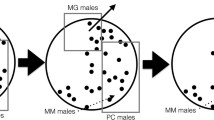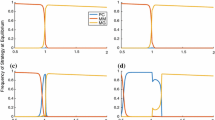Summary
Large potential effects of male care on the number of offspring females successfully raise are not sufficient to select for caring males because of the pervasive importance of mating competition. Males face a version of ‘the social dilemma’, in which increased production increases the pay-off for theft. Models of the allocation of male effort partitioned between caring for babies and competing for paternity show that the optimal allocation to care is very low under a wide range of conditions. Like sex allocation where the alternatives are male versus female function or sons versus daughters, the pay-offs to one alternative are always strongly frequency dependent. Because that alternative (male function, sons, male mating effort) pays so well when rare, it cannot remain rare under most conditions. Here we consider the consequences of partitioning mating effort into mate guarding and all other forms of mating conflict. If a male gets all his partner's conceptions while guarding, gaining them at a constant rate, there are two possible regions of stability. The evolutionarily stable strategy (ESS) depends on a parameter scaling the decisiveness of (non-guarding) mating conflict. When marginal returns from conflict decrease with scale, almost all effort goes into guarding. When marginal returns increase, the ESS devotes all effort to mating. Even when the potential effect of care is large, male equilibrium strategies allocate little effort to it. We also report the results of computer simulations showing that care increases if gains from guarding saturate quickly, so that a male is assured of the paternity of most of his partner's offspring with little guarding, and consequently the pool of unguarded conceptions open to competion shrinks sharply. But even when the male's dilemma is very much reduced, it still substantially limits the allocation to care. The results of both computer simulations and mathematical analysis converge with other lines of evidence that mating has much stronger effects than parenting in shaping male strategies.
Similar content being viewed by others
References
Alexander, R.D., Hoogland, J.L., Howard, R.D., Noonan, K.M. and Sherman, P.W., (1979) Sexual dimorphisms and breeding systems in pinnepeds, ungulates, primates, and humans. InEvolutionary biology and human social behavior: an anthropological perspective (N. Chagnon and W. Irons, eds) pp. 402–35. Duxbury Press, North Scituate, MA.
Birkhead, T.R. and Moller, A.P. (1992)Sperm Competition in Birds: Evolutionary Causes and Consequences. Academic Press, London.
Charnov, E.L. (1982)The Theory of Sex Allocation. Princeton University Press, Princeton.
Davies, N.B. (1991) Mating systems. InBehavioural ecology: an evolutionary approach, third edition, (J. Krebs and N. Davies, eds) pp. 263–94. Blackwell Scientific Publications, Oxford.
Davies, N.B. (1992)Dunnock Behaviour and Social Evolution. Oxford University Press, Oxford.
Fisher, R.A. (1930)The Genetical Theory of Natural Selection. Clarendon Press, Oxford. Reprinted 1958, Dover, New York.
Hamilton, W.D. (1967) Extraordinary sex ratios.Science 156 477–88.
Hawkes, K. (1990) Why do men hunt? Some benefits for risky strategies. InRisk and uncertainty (E. Cashdan, ed.) pp. 145–66. Westview Press, Boulder.
Hawkes, K. (1993) Why hunter—gatherers work: an ancient version of the problem of public goods.Curr. Anthropol. 34 341–61.
Hirshleifer, J. (1991) The paradox of power.Econ. Politics 3 177–200.
Hirshleifer, J. (1995) Anarchy and its Breakdown.Journal of Political Economy 103 26–52.
Kleirman, D.G. (1977) Monogamy in mammals.Q. Rev. Biol. 52 39–69.
Lack, D. (1968)Ecological Adaptations for Breeding in Birds. Metheun, London.
Lancaster, J. and Lancaster, C. (1983) Parental investment: the hominid adaptation. InHow humans adapt: a biocultural odyssey (D. Ortner, ed.) pp. 33–65. Smithsonian Institution Press, Washington, DC.
Lovejoy, C.O. (1981) The origin of man.Science 211 341–50.
Moller, A.P. (1994)Sexual Selection and the Barn Swallow. Oxford University Press, Oxford.
Orians, G.H. (1969) On the evolution of mating systems in birds and mammals.Am. Nat. 103 589–603.
Smuts, B.B. (1985)Sex and Friendship in Baboons. Aldine, New York.
Smuts, B.B. and Gubernick, D.J. (1992) Male—infant relationships in nonhuman primates: paternal investment or mating effort? InFather—Child relations: cultural and biosocial contexts (B. Hewlett, ed.) pp. 1–29. Aldine de Gruyter, New York.
Tullock, G. (1974)The Social Dilemma: The Economics of War and Revolution. The Center for the Study of Public Choice, Blacksburg, VA.
Washburn, S.L. and Lancaster, C. (1968) The evolution of hunting. InMan the hunter (R. Lee and I. DeVore, ed.) pp. 293–303. Aldine, Chicago.
Westneat, D.F. and Sherman, P.W. (1993) Parentage and the evolution of parental behavior.Behav. Ecol. 4 66–77.
Westneat, D.F., Sherman, P.W. and Morton, M.L. (1990) The ecology and evolution of extra-pair copulations in birds. InCurrent ornithology (D. Power, ed.)7, pp. 331–69. Plenum, New York.
Whitten, P.L. (1986) Infants and adult males. InPrimate societies (B. Smuts, D. Cheyney, R. Seyfarth, R. Wrangham and T. Struhsaker, eds) pp. 343–57. University of Chicago Press, Chicago.
Author information
Authors and Affiliations
Rights and permissions
About this article
Cite this article
Hawkes, K., Rogers, A.R. & Charnov, E.L. The male's dilemma: Increased offspring production is more paternity to steal. Evol Ecol 9, 662–677 (1995). https://doi.org/10.1007/BF01237661
Issue Date:
DOI: https://doi.org/10.1007/BF01237661




